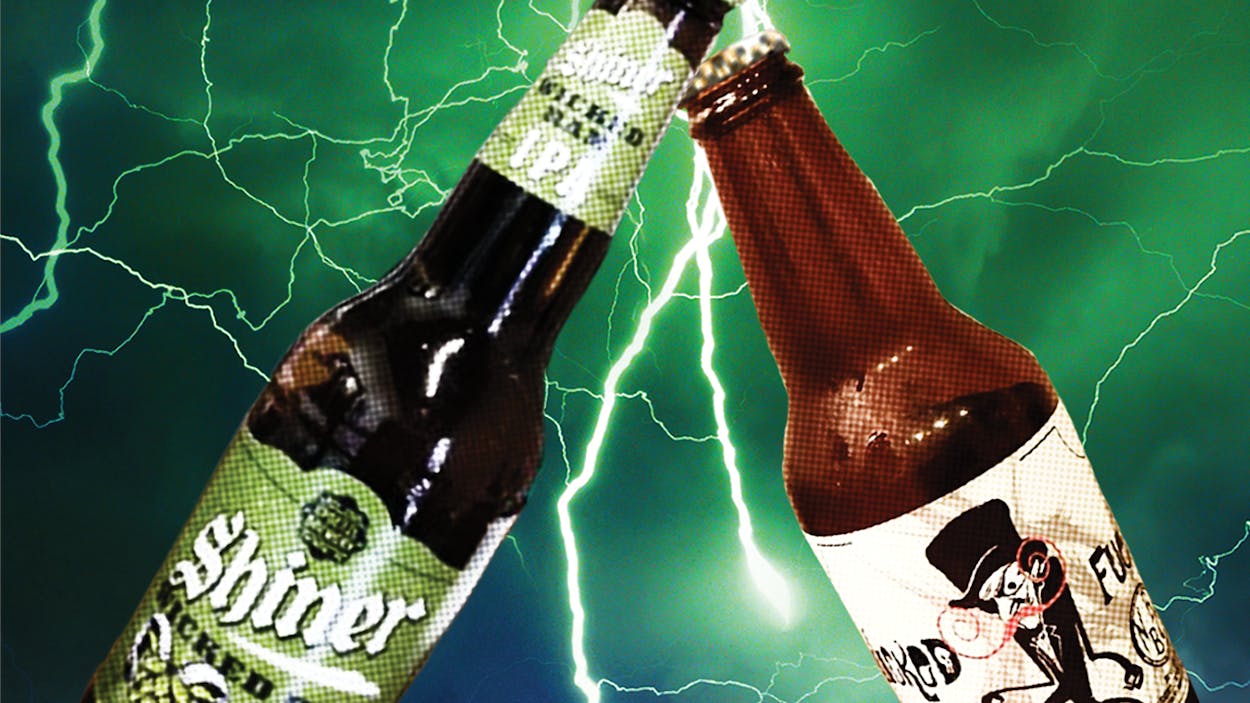There’s no rest for the wicked—at least not in the world of Texas craft brewing.
A rift in that community opened up in November, when the San Antonio–based Gambrinus Company, owner of the Spoetzl Brewery and Shiner Beer, sent New Braunfels Brewing Company a trademark infringement letter. The cease-and-desist letter advised New Braunfels’s owner, Kelly Meyer, that Gambrinus has owned the trademark for use of the word “Wicked” in promoting beer since 1998, when it purchased Pete’s Brewing Company, maker of Pete’s Wicked Ale. The company asserted that New Braunfels’s Wicked Fuel, a seasonal dark beer infused with Jet Fuel coffee from Independence Coffee Company, in Brenham, was infringing on that trademark, most recently used to market Shiner’s new IPA, Wicked Ram.
Unconvinced—and more than a little peeved—Meyer hammered out a manifesto in response, which he posted to his brewery’s blog and later to Twitter (the company’s Twitter bio reads, “Dynamically innovative wheat beers from people with a compulsion to color outside the lines”). “I actually drank the crap out of Pete’s Wicked Ale as a kid so this whole thing is kinda like shaking hands with one of your idols,” Meyer wrote. “It’s pretty cool. But I have to admit, it’s also pretty stupid.”
Meyer closed his self-described “successful rebuttal” with an offer: “Let’s do this. . . . If anyone drinks ours thinking it’s yours, we’ll give them their $5 back and spend a few minutes explaining the difference between coffee and brewer’s hops. If you guys have someone who could do the same on your end, that’d be Wicked Awesome.”
Shiner may be a Texas icon, but craft beer aficionados wasted no time in sharing Meyer’s statement on social media and adding their own editorials. Many chided Gambrinus for throwing its weight around—in terms of sales volume, it’s the tenth-largest brewer in the country—and cast the incident as a battle between David and Goliath. “With corporate money comes corporate greed,” wrote Tim Foley on his blog All About Texas Craft Beer. “Instead of beating the competition with your product, it’s about beating the competition with lawyers and bullying. . . . This is WRONG. This is bullying. This is pathetic.”
It’s also pretty standard business practice. “They want to make us look like we’re trying to pick on them, and that’s just not the case,” says Charlie Paulette, the director of sales and marketing at Gambrinus. “We don’t want them to stop brewing the beer, we just want to agree that we’re going to share this trademark under certain conditions.”
As owner of the trademark, Gambrinus is required to protect “Wicked” or risk losing it, and cease-and-desist letters are evidence to the U.S. Patent and Trademark Office that Gambrinus is fulfilling its responsibility. But such letters aren’t as ominous as they might appear; they’re often the first step in negotiations toward an agreement to share the name. Though some trademark-related communications result in a name change (in late October, Austin-based Adelbert’s Brewery changed the name of its Belgian IPA from “The Traveler” to “The Travelin’ Man” after being contacted by Vermont’s Traveler Beer Company), Paulette says Gambrinus has worked out coexistence agreements with “a good majority of anything out there that has ‘Wicked’ on it.” Thus drinkers can taste-test Wicked Ram alongside pints from Wicked Weed Brewing, in North Carolina, and Redd’s Wicked Apple Ale, by MillerCoors. (The Lubbock-based Wicked Beaver Brewery closed in October for non-Wicked-related reasons.)
The proliferation of craft breweries—more than 4,000 nationally and about 150 in Texas—means it’s getting harder to christen brews with original names that are the right alchemy of wit and snark. Why is “Wicked” so popular? Meyer’s theory: “Almost all the craft beer that’s really good is a little bit contrarian by nature. ‘Wicked’ is a little more serious than mean, and a little bit more strange and out there.”
The day Meyer’s blog post hit the web, Paulette, in an attempt to dial down the seriousness, called to suggest that the two companies work something out. At press time, the brewers were drafting an agreement that would allow Meyer to use the name “Wicked Fuel” but would define the beer’s distribution area and seasonal production.
Meyer says he would have preferred an old-fashioned phone call from Gambrinus rather than a letter from its lawyers, and Paulette says he would have liked Meyer to call off the social media troops after their initial phone conversation. But they seem to have put their squabble behind them: Paulette has invited Meyer to visit the Spoetzl Brewery and says he plans to stop by Meyer’s headquarters, in New Braunfels. At whichever meeting happens first, the two will sit down and make peace over a cold one.







